Indie drama Aftersun combines lyrical, nostalgic moments with stabs of pain and isolation in its tale of a father and daughter on holiday. Writer/director Charlotte Wells and star Paul Mescal tell Ben Dalton about the filming of five key scenes.
Few debut features in recent years have matched the critical and commercial acclaim of Wells’ Aftersun.
Launched in Cannes Critics’ Week last year, the UK-US indie drama scored distribution deals with A24 for North America and Mubi for multiple international territories during the festival. It has since gone on to four Bafta nominations, and one at the Oscars for lead actor Paul Mescal; plus seven wins at the British Independent Film Awards including four for Wells.
Aftersun sees Sophie, a woman in her early 30s, recall a holiday she took with her father Calum to a Turkish beach resort in the late 1990s, when she was 11. The duo laze by the pool, take a mud bath and visit local shops, all the while discussing the minutiae of their lives. Wells has described Aftersun — which was shot in Turkey in summer 2021 — as fiction rooted in experience and memory. It was inspired partly by flipping through old family photograph albums and being surprised at how young her father looked.
Screen discusses five key scenes with Wells and Mescal… spoilers ahead.
Father-daughter bonding
The scene: Calum (Paul Mescal) and Sophie (Frankie Corio) relax at a café overlooking the ocean, discussing Sophie’s ‘Nana’ (Calum’s mother), Sophie’s return to school, and a teacher who Calum thinks is pretty.
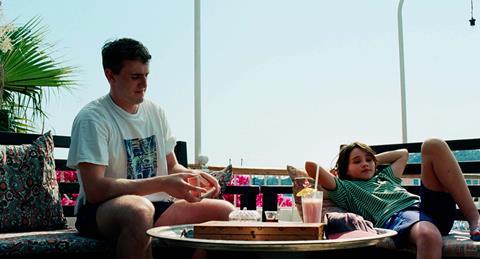
CHARLOTTE WELLS: “It was one of the fresher dialogue scenes — it hadn’t really been touched in the audition or rehearsal process. It was one of the rare moments of unbridled joy and fun you see between the characters. If I could change anything, it would be giving myself more of these moments to work with.
“Seeing Calum so expressively goofy, and Paul maniacally smile with the line about the teacher is so perfect and loveable. The way Frankie slowly sits up is one of my favourite performance moments in the film. We were pushed to cut that scene because it felt extraneous to some people; it always felt important to us to provide that moment of fun between them.
“It was a challenging day — the first day that we had shot outside of the hotel. Frankie had become savvy to film production by that point.”
PAUL MESCAL: “[Frankie] absorbed in the first two weeks the understanding of where the camera was, what it was doing, what she needed to achieve. When Sophie asks, ‘When was the last time you were up to see Nana?’, there is a beat where Calum registers that he hasn’t seen her in a long time. We see that thought percolate, then he [mentally] goes, ‘Okay, next thing — I’m not going to dwell right now on the guilt I feel about not tending to relationships.’
“It’s rare to have moments like that as an actor where you get to fully invest in the backstory of this character’s life for a moment that lasts three seconds, and then disappears. But it tells you a lot about his self-isolation; it gives you an indication that he is not reaching out to his family or friends.”
WELLS: “There is backstory in the film, just not in your face — it’s scattered in moments like that. Losing moments like that felt like it hurt the film. Why hasn’t he been to see his mom? It’s not answered, but it is asked. It felt important to retain.”
Sophie captures Calum on camera
The scene: Sophie gets a reluctant Calum to recall his 11th birthday, while her live recording of her father on a digital video camera plays on the hotel bedroom TV.
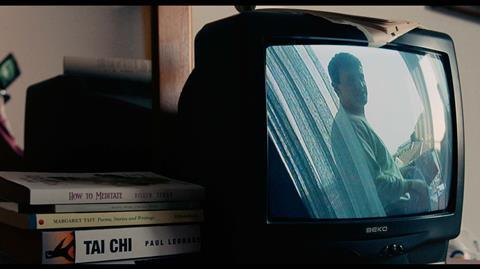
WELLS: “It was written [for the camera feed to play on the TV] — I thought we would record it a few times, then just play it back. I hadn’t imagined the reflection on the TV. We figured out a placement for both the television and the mirror, which allowed for the shot to have five or six different images within the frame — it’s so satisfying for me. The first take is in the film — a lot of happy accidents happened. It was remarkable that Frankie puts the [DV] camera down next to the TV, in sight of our camera.”
MESCAL: “My first memory of that scene was the reading of it — the level of imagination, shot construction and the brain capacity that Charlotte generates with constructing a shot like that. There was not a lot of time to think technically with this film — I handed that over to Charlotte and Greg [Oke, cinematographer], because my job was to be there with Frankie, or be there with my thoughts when I was by myself. It takes Calum a second to get there, then you get a description — not a confession, not even an explanation — of his 11th birthday. I love Sophie’s line, ‘What [present] did you pick?’ and Calum responds, ‘I chose a toy phone and it was red.’”
WELLS: [Commenting on Sophie’s next line, ‘Good choice’] “That’s a Frankie line — it wasn’t in the script. There is not much improvisation in the film, but where it is, it is remarkable. The dialogue in that scene has a bit more direction than other dialogue in the film. From a performance point of view, Calum is evading physically. The direction there was, ‘Try not to get caught by the camera for too long.’”
MESCAL: “When Calum was upset, Frankie would try to subvert that, as children do. She had this wonderful way of disengaging from it and being a child.”
Sophie sings karaoke alone
The scene: Sophie has entered herself and her father to sing karaoke at the holiday resort, but Calum can’t face it. Sophie sings REM’s ‘Losing My Religion’ and returns to a tense moment between the pair.
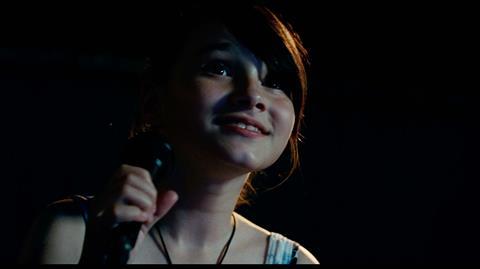
WELLS: “Greg and I specifically shot-listed that the beginning of the scene would play out from behind [Calum and Sophie as they sit on tiered seating], then the conversation afterwards would be a two-shot profile from the side. This has been a day that’s ebbed and flowed — they have constantly missed each other, never quite been on the same page. This is a moment where one is constantly reaching out to the other. It never felt right to have them shot side-by-side from the front, as though they were aligned.”
MESCAL: “The conflict of that moment [Calum hears their names called out for karaoke] is fundamentally knowing that he should get up and do this with Sophie. But there’s just no way he can generate that energy for her at that moment. I find that devastating — seeing her go up and him still not being able to do it.
“When she comes back and he goes straight to, ‘If you want to learn how to sing, I can get you singing lessons’ — that is one of the moments in the script where I recognise my dad. There’s something about wanting to improve things to deflect away from why he did not step up and do the thing he should have done. When I watch the film back, that’s one of the scenes I am most proud of between myself and Frankie.”
WELLS: “There was a take [of the conversation] in which you said something along the lines of, ‘I’m glad you’re going home.’”
MESCAL: “Wow — that was it. I remember thinking, ‘I can’t believe I have to say this.’”
WELLS: “And Frankie stayed in it. As soon as we said ‘cut’, she was like, ‘That is so harsh.’”
Calum sobs in pain
The scene: After a day trip during which Sophie gets fellow holidaymakers to sing to her father for his birthday, the scene dissolves to Calum sobbing heavily while seated alone on the hotel bed.
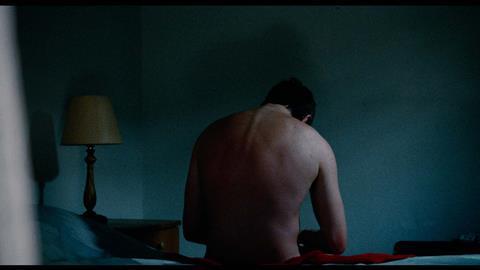
MESCAL: “Two things go off in your brain [when reading a scene like this]. The actor part of your brain thinks, ‘Okay, that’s a level you have got to get up to and achieve’. Then there’s the version of a first-time reader — I remember feeling a great deal of empathy, sadness and sympathy for Calum. That grief or sadness or upset is coming from a lack of understanding about what is going on in his head. It is not about a specific thing, not about ‘happy birthday’ being sung to him. It is about why isn’t two and two adding up to four? I should be having a good time here. Why am I not? It’s confusion — sometimes the biggest outpourings of any emotion come when you can’t pin down why that’s happening.”
WELLS: “It was written silhouetted against the window. Greg [successfully] argued that he should be boxed into the corner of the wall, and there should not be a sense of space and a future ahead of him. We shot it twice; [the scene] cements it for anyone who was still in doubt of the desperation that Calum feels.
“They were long takes — the camera slowly pulled further out until it settled. I like hearing Paul speak about it, because it was one of those moments where I really ceded the character to him. I am not a director who believes in safety takes — that’s kind of shitty for actors.”
MESCAL: [laughs] “I would have just told you no. The preparation is in the doing of it, and not just on the day. We were three or four weeks into the shoot, with a lot of associations banked up. I don’t find it useful to rely on things that exist outside of the character’s psyche — I don’t want to have crutches that I lean on. I remember saying to Charlotte that if we get to where it’s going to get to, it’s going to be difficult to stop and restart.”
WELLS: “That’s one example where we were not coming back. Everybody is here, Paul is here. Let’s make sure we have this, and then we move on.”
The ‘Under Pressure’ strobe sequence
The scene: As ‘Under Pressure’ by Queen and David Bowie plays amid a strobe light, Sophie’s memories of the holiday fuse with an imagined meeting between her adult self and her father as he was, during which she screams at him and they grasp each other tightly.
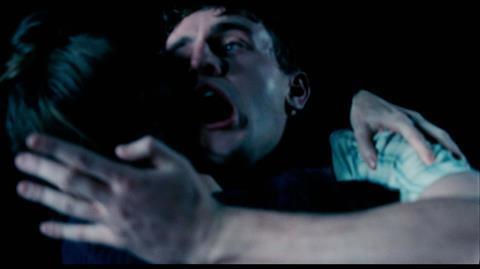
WELLS: “It was the last thing we shot in our main location in Turkey; it was shot in a tomato warehouse in the countryside, in 45-degree heat — I think one of our producers passed out.
“As well as a filmmaker, Celia [Rowlson-Hall, who plays adult Sophie] is a dancer and choreographer. Casting her felt smart in terms of how essential movement was — it wasn’t a dance per se, but a sequence all about movement.
“It is executed close to what’s on the page. It felt important that we create an intensity on set — we had loud music. I remember Celia blocking out the first movement of that last interaction, and it was among the most moved I felt on set. There was something gutting about this movement where she reaches Calum from behind and wrestles control.”
MESCAL: “I remember feeling cathartic. As a broad description, there is something quiet about Calum in the film.
“But this — there is something emotionally explosive about it, a size and theatricality to it; when I watch the film, something different happens to my face. I remember feeling Celia clamping on to me, feeling like I was melting away, and trying to explode out of that — using a different set of creative muscles [to those] I had used throughout the previous six weeks. I found that cathartic, upsetting, exciting and alive creatively.”






![The Brightest SunScreen[Courtesy HKIFF]](https://d1nslcd7m2225b.cloudfront.net/Pictures/274x183/3/5/0/1448350_thebrightestsunscreencourtesyhkiff_312678.jpg)












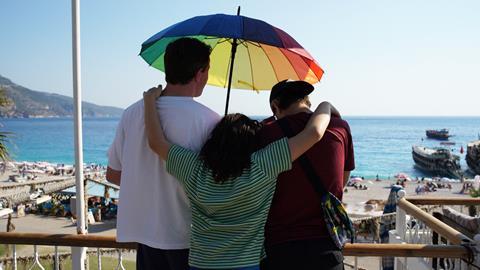






No comments yet